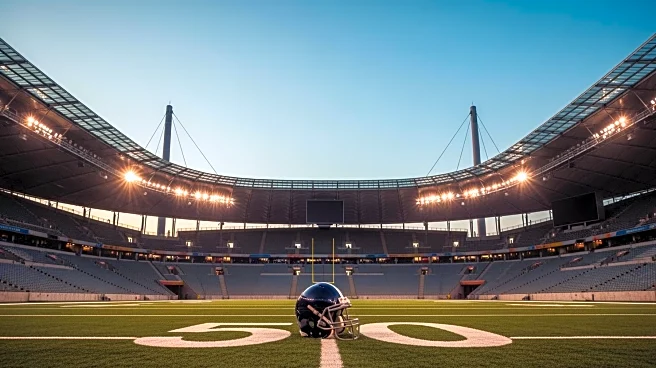What's Happening?
The Olympic Stadium in Berlin, Germany, is set to host its first NFL game between the Atlanta Falcons and Indianapolis Colts on November 8, 2025. This event marks the NFL's debut in Berlin and is only
the fourth time the league has sent teams to Germany. Previously, games were held in Munich and Frankfurt. The stadium, known as Olympiastadion, has a capacity of 74,475 and has been the home of Bundesliga's Hertha Berlin since 1963. It has also hosted major events like the 2006 World Cup Final and the 2015 UEFA Champions League Final. The Colts, tied for the best record in the NFL, will play as the home team, while the Falcons will be the visiting team.
Why It's Important?
Hosting an NFL game in Berlin signifies the league's expanding international presence and its commitment to growing the sport's popularity outside the United States. This event could boost tourism and local economy in Berlin, as fans travel to witness the historic game. It also highlights the NFL's strategy to engage European audiences, potentially increasing merchandise sales and broadcasting rights in the region. The game could pave the way for more international matches, enhancing cultural exchange and sports diplomacy between the U.S. and Germany.
What's Next?
Following the Berlin game, the NFL plans to continue its international series with a match in Spain, further solidifying its global outreach. The success of these games may lead to more frequent international scheduling, with potential expansion into other European cities. Stakeholders, including team owners and sponsors, will likely evaluate the financial and cultural impact of these games to strategize future international engagements. The NFL's growing presence in Europe could influence other American sports leagues to consider similar expansions.
Beyond the Headlines
The NFL's international games may influence the development of American football leagues in Europe, encouraging local talent and increasing participation in the sport. This could lead to long-term shifts in sports culture, with American football gaining popularity alongside traditional European sports like soccer. Additionally, the event raises questions about the environmental impact of international sports travel and the sustainability of such expansions.










